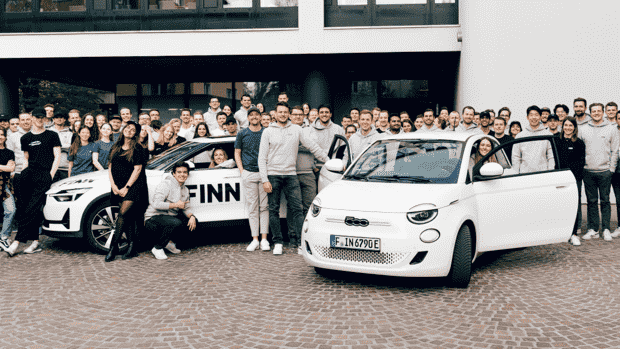Dusseldorf If you currently want to order a new car, you need patience. The delivery times for electric models, for example, are up to 18 months. New vehicles are available more quickly in combination with a car subscription. These monthly models are still a niche offer in Germany, but one that is also growing due to the availability bottlenecks – and the start-up Finn, which is one of the first providers of car subscriptions in Germany, is benefiting from this.
The start-up has increased its sales from four million euros in 2020 to more than 100 million euros within two years, as co-founder Maximilian Wühr revealed to the Handelsblatt. A value that leaves an impression on the start-up scene and is higher than some unicorns, i.e. start-ups with a valuation in the billions.
With well-known investors and loans worth millions, Finn has massively expanded its fleet since it was founded three years ago. In the subscription model, customers usually pay slightly higher monthly rates than with classic leasing.
A lot of work is done for them: insurance and maintenance are included. Customers only have to pay for refuelling, whether it be petrol, diesel or electricity. In addition, the terms are more flexible, ranging from one month to 24 months. However, many models have minimum terms of six or twelve months. Nevertheless, it enables customers to use it as needed without tying up tens of thousands of euros in cash or financing in a vehicle.
Top jobs of the day
Find the best jobs now and
be notified by email.
According to a study by the Center of Automotive Research (CAR), the proportion of car subscriptions in the private customer segment is likely to increase in the coming years from 0.2 percent in 2020 to 40 percent in 2030. In absolute numbers that would mean: from 40,000 to around one million. “Car subscriptions will play an increasingly important role as a sales channel for car manufacturers,” Helena Wisbert, Professor of Automotive Economics and Director of CAR, is convinced.
Availability problems are also slowing down the subscription industry
Start-ups like Finn agree with the manufacturers to buy a certain number of cars. The company’s website offers 40 models from 25 automobile manufacturers, including Audi, BMW, Tesla, Volkswagen, Hyundai and Opel. Vehicles are only offered to customers when they are already available. In most cases, the conditions for the buyback of the young used car are already agreed at the time of purchase, or the used vehicles are resold to dealers.
>> Read also: Volkswagen sells car-sharing subsidiary Weshare
The tense situation in car production brought Finn new customers, but it also slowed down growth. “That hasn’t made the last year and a half any easier,” explains Wühr, since manufacturers usually sold their few vehicles on the most lucrative channel and gave few discounts.
Compared to the average car buyer, Finn’s customers are younger and more open to new technologies. Anyone who takes out a car subscription with the start-up is on average 37.5 years old. “This is an extremely attractive target group for manufacturers,” says Finn co-founder Wühr.
Every third Finn customer opts for an electric car. While car sales have fallen due to the ongoing chip crisis and the growing reluctance of car buyers, Finn’s subscriptions have grown to more than 20,000.
“An extremely attractive target group for manufacturers.”
(Photo: finn.auto)
In the future, the car manufacturers could occupy the market for car subscriptions themselves, but market expert Wisbert is convinced that start-ups could definitely establish themselves. The platforms have the advantage of being able to offer many different models compared to the manufacturer’s own offers such as Volvo and Mercedes. In terms of prices, there is a cut-throat battle: “Sometimes there were rates for car subscriptions that were below the leasing price.” Companies like Cluno recently had to give up, and established providers such as the car rental company Sixt are also massively expanding the range of car subscriptions. In such a market, growth is currently even more important than profitability.
The USA as a significant growth market
Finn closed its most recent $100 million funding round in May 2022. Investors include HV Holtzbrinck Ventures, Heartcore, UVC Partners and Picus Capital. In addition, financing agreements were concluded for 500 million euros and 200 million dollars for the procurement of new vehicles.
Finn is currently making losses, admits co-founder Wühr. This is mainly due to the rapid expansion of the fleet. With “every vehicle and every customer” you earn money today. In 2023 they want to be profitable in the core market of Germany. “We assume that the market will grow rapidly in the coming years. Then we want to be in a strong position,” emphasizes Wühr. He predicts that two or three companies will emerge from the competition as winners.
Every third customer opts for an electric car.
(Photo: Finn)
In the home market of Germany, however, a political decision could ruin business for 2023: the state purchase premiums for commercial buyers of electric cars are running out. The subscription prices for e-cars should also increase as a result. However, Wühr sees himself well-armed: “We also want to develop a long-term business model for electric cars and not rely on the purchase premium.”
Finn not only wants to grow quickly in the home market. The start-up recently expanded to the USA. Although even Tesla boss Elon Musk has repeatedly emphasized that the future of the car could not lie in private ownership but in subscription models, the number of competitors in the US market is even smaller. “We’re growing twice as fast there as in Germany,” says Wühr. Today you are already represented in eleven states. In New York and California they want to start in the coming months.
More: “Flexibility is the new premium” – e-car builder Nio starts with car subscription in Germany
